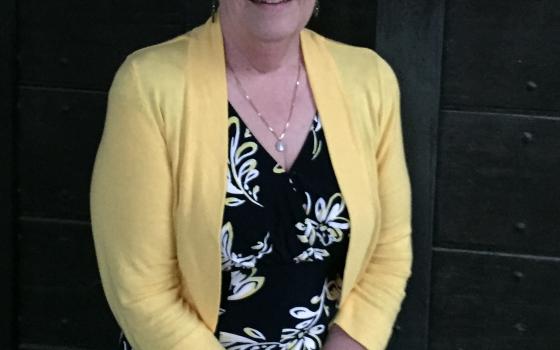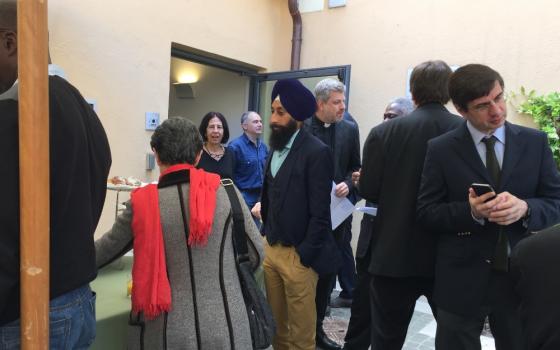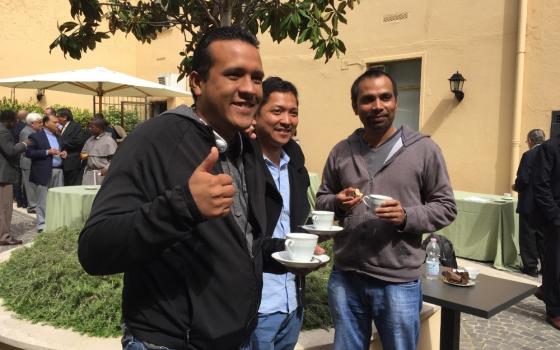Like so many people, I never know what will appear in my email. The most surprising for me this spring was an invitation to attend the global seminar "Sustainable Development and the Future of Work in the Context of the Jubilee of Mercy." The seminar, co-sponsored by the Vatican Council for Justice and Peace, the International Labour Organization and Caritas Internationalis, was to be held in two weeks.
Representing Catholic Scholars for Worker Justice, I joined about 100 others from around the world from May 2-5 at Notre Dame University in Rome to share experiences and challenges in this age of climate change and economic globalization. When I arrived I found leaders from Catholic grassroots organizations, trade unions, youth movements, employers' associations, educational institutions, the International Labour Organization, the Pontifical Council for Justice and Peace, and Caritas Internationalis. I had never found myself in such a diverse group that brought so many varying perspectives to a common concern.
One of the most memorable participants for me was Samuel LeCoeur from Association Amelior who works with waste pickers in Paris. Waste pickers go through the trash, rescue usable items, clean them and repair them when necessary. They then sell them at flea markets. LeCoeur raised the latest challenge for them: the government has closed all but three of the flea markets. That makes it much more difficult to get their products to market. Amazing to me was that within the first two days of the conference, LeCoeur had met the waste pickers of Rome! Most of us would not have known where to look for that population in the city that hosted us. However, there is a global organization of waste pickers. Who knew?
I have always known, and I have met, ethical business men and women — and I met them in Rome as well. One particular employer from the Ivory Coast, M. Bernard Ndoumi, described the division that can occur in the workplace: "We live in the same place and think we are in different worlds. If you live in the same house, you need to get to know one another." He spoke of the key role for social dialogue in moving toward a future in which the dignity of all is upheld. Social dialogue enables governments and employers' and workers' organizations to manage change and achieve economic and social goals. It demands that all parties respect the other.
Many times over the course of the conference we heard about the importance of focusing on the dignity of the human person when we speak about sustainability and development goals, particularly the dignity of the worker and her/his family. We recognized that the understanding of the workplace must expand beyond seeing the office or the factory as the place of work, since the informal economy is the workplace of many people in the world. That workplace might be the streets of Paris for the waste pickers, the homes of women who eke out a living quilting or baking or taking care of children, or the fields of family farms across the globe. As we read in Laborem Exercens, the dignity of work rests on the dignity of those who do the work.
We heard again and again about the place of technology in the future of work. On the one hand, technology is amazing. It enables us to connect across vast geographies. It has created jobs that call on the creativity of people. On the other hand, technology has been used to increase production with fewer employees. Jobs are lost and people are added to the "throw-away economy." Then we can too easily accept the "new normal" of high unemployment and the race to the bottom because of the overvaluation of technology and the devaluation of labor regulations.
To say that I was excited about attending the seminar was an understatement. Then I was invited to speak! I was given five minutes to address the topic of the session, "the service of mankind [sic], of every condition, in every weakness and need." As vice-chair of Catholic Scholars for Worker Justice, I was able to share with those gathered why and how we are supporting adjunct professors in U.S. colleges and universities who face poverty wages with no benefits.
At the end of our seminar, we issued a statement of commitment and action in which we pledged to "promote dignity, dialogue, and the promotion of human rights and international labor standards as the core of any sustainable development policies."
In addition we stated, "We further believe that the Catholic Church, other religious organizations, and civil society as a whole, have a serious responsibility to promote just work policies and practices, both within their respective institutions and in all sectors of society, and to report all forms of exploitation and abuse of human dignity, particularly in the context of the Catholic Church's observance of the Extraordinary Jubilee Year of Mercy."
The Jubilee Year of Mercy and the upcoming centenary of the International Labour Organization (ILO) call the global community to recognize the dignity of the worker and the importance of decent work. As Pope Francis said in his announcement of the Year of Mercy, we are reminded "never to stop at the surface of things, especially when we have a person before us. We are called to look beyond, to focus on the heart in order to see how much generosity everyone is capable of."
As it prepares for its centenary, the ILO names four pillars for a decent work agenda: employment creation, social protection, rights at work, and social dialogue. Those four pillars challenge us to focus on the heart, to see the person, particularly the worker, as the center of development.
In spite of our coming from so many different experiences of work across the globe, perhaps because of it, we recognized how essential the building of relationships is to promoting a future for decent work and solidarity among workers internationally. We committed ourselves to three actions: broad outreach to the tripartite constituencies of the ILO (governments, worker organizations and businesses), organization of regional consultations, and regular exchanges among participants in these consultations.
In Rome, the celebration of the efforts of so many diverse groups became a source of inspiration for those of us desiring to create a future of work that would be based on upholding the dignity of the worker and the sustainability of Earth.
[Mary Priniski is a Dominican Sister of Adrian. In addition to being director of the Boston Labor Guild, she has worked with Southerners for Economic Justice, Interfaith Worker Justice and the Service Employees International Union. She is currently working on Gathering for Mission, a project of Catholic Committee of the South.]



